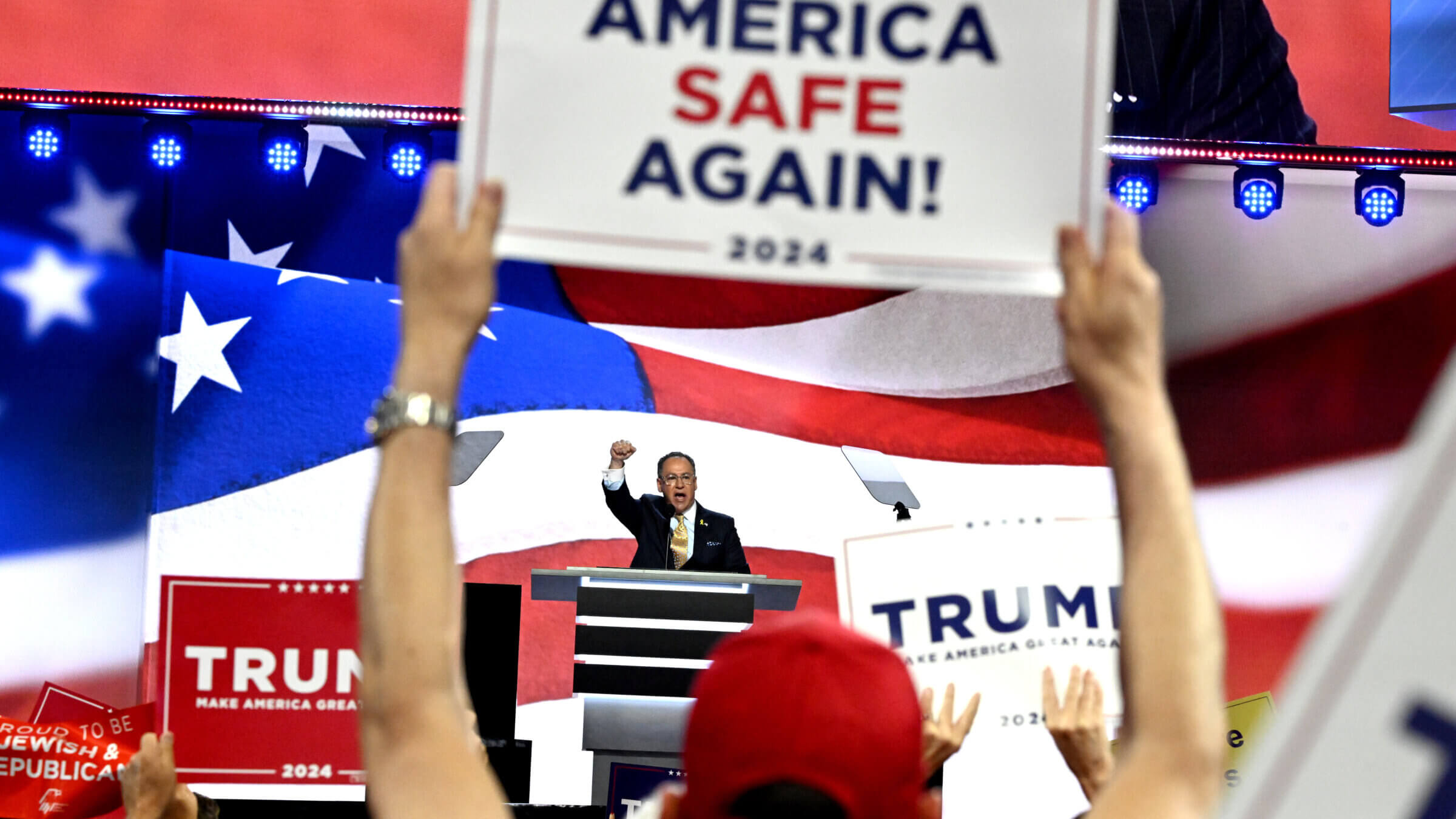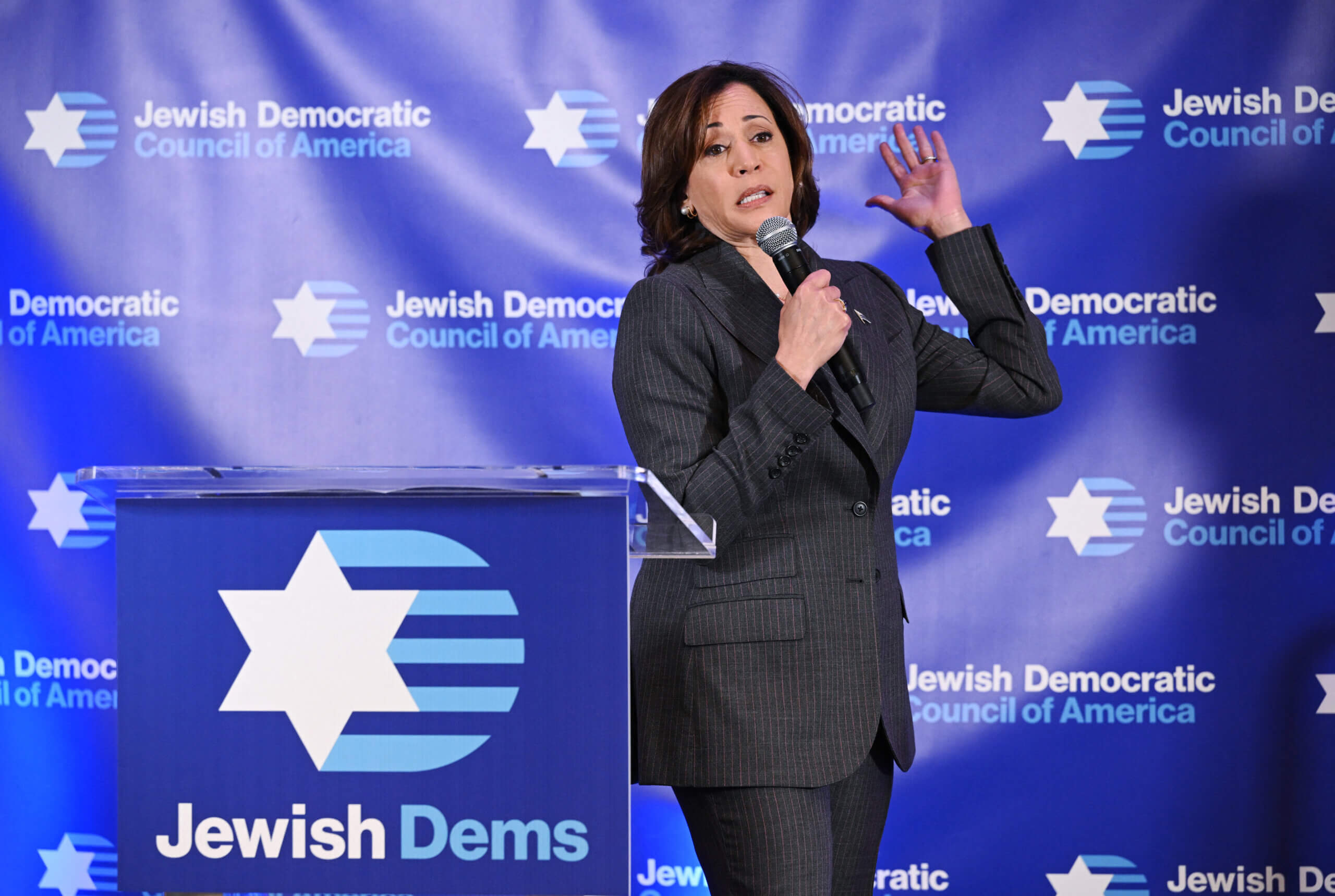As spending by Jewish PACs soar, two billionaires give GOP group major fundraising advantage
New campaign finance data shows Miriam Adelson and WhatsApp founder fueling Republicans

Matt Brooks, chief executive officer of the Republican Jewish Coalition speaks during the Republican National Convention in July. His organization is spending 50% on this year’s presidential race than they did in 2020. Photo by Getty Images
Fueled by donations from two conservative billionaires, the leading Republican Jewish political action committee is pouring millions of dollars into a swing-state advertising blitz supporting former President Donald Trump in the final weeks of the campaign, according to the Federal Election Commission.
Both the Republican Jewish Coalition and its Democratic counterpart have seen spikes in donations this cycle from 2020, though the Jewish Democratic Council of America has raised about a quarter as much, and is spending most of it on voter turnout efforts including phone banks and targeted online ads.
The RJC raised more than $18 million since the start of last year, FEC records released last week show, including a $5 million donation from Miriam Adelson, widow of the casino magnate Sheldon Adelson, and $2.4 million from Jan Koum, the co-founder of WhatsApp.
The Jewish Democratic Council of America, in contrast, has raised $4.5 million overall and $2.2 million for its PAC — a 70% increase compared to its 2020 haul. Its largest donations, of $100,000 each, came from Stacy Schusterman, who runs a major Jewish foundation, and Jonathan Lavine, chair of Bain Capital.
The totals include money raised by the groups’ political action committees, which can donate directly to candidates, as well as their Super PACs, which cannot coordinate with campaigns but can run advertisements supporting candidates.
Two other Jewish groups that donate to Democrats, J Street and Democratic Majority for Israel, have raised more than $20 million combined this cycle, while AIPAC — which supports Congressional candidates from both parties, has raised more than $80 million, with most of its spending going to defeat progressive Democrats in primary contests.
Matt Brooks, director of the RJC, said the group would spend 50% more during this campaign than it did in 2020. The Super PAC alone has more than doubled the $6.6 million it raised four years ago.
“This is the most consequential election in our lifetimes,” Brooks said in an interview. “We wanted to make sure that we had the full resources we needed.”
Millions for TV ads backing Trump
The RJC was created in 1985 and Sheldon Adelson helped make it as a force in Republican politics by bankrolling the organization for many years. Miriam, whose net worth Bloomberg estimates at $37.8 billion, has continued supporting the group since her husband’s 2021 death, while also putting $100 million into her own Preserve America PAC to support Trump’s reelection.
Koum, a Ukrainian-born Jew who shies away from publicity, has used his fortune estimated at more than $9 billion to become one of the world’s largest donors to Jewish causes, including AIPAC, groups in the former Soviet Union, and nonprofits in Israel.
The RJC has given nearly $2 million directly to Trump and an associated Super PAC, but most of its spending — more than $16 million — is going towards television ads in swing states including Pennsylvania, home to some 300,000 Jewish voters, and Arizona (85,000).
“Oy vey,” a character says in one spot that the RJC is running in five states for a total of more than $1 million, according to group. “You know, Trump I never cared for, but at least he’ll keep us safe.”
Democrats emphasize ground game
While Trump was the largest recipient of RJC funds, the JDCA has so far given more — $31,650 — to Rep. Elissa Slotkin of Michigan, who is running for Senate, than to Vice President Kamala Harris ($21,000).
Halie Soifer, CEO of JDCA, said that her organization was focused on reaching Jewish voters through targeted tactics, including phone banking and online ads, that are much cheaper than television time, especially in the metropolitan areas where most Jews live.
“That is the most impactful way to reach voters,” Soifer said in an interview. “And that is what the RJC is lacking.”

JDCA spent less than $2,000 to show its latest ad on Facebook more than 200,000 times to users primarily in Pennsylvania, Michigan and Georgia, according to the social media company. The 30-second video warns that Trump is “scapegoating Jews” and shows Harris lighting a menorah.
In addition to Schusterman and Lavine, major donors to the JDCA include Jeff Schoenfeld, a New York investment banker who has helped distribute the Jewish federation network’s post-Oct. 7 emergency funding for Israel, who gave $50,000; and Charles Bronfman, a Canadian-American Jewish philanthropist and billionaire, chipped in $25,000 last spring.
Groups trade barbs
The Democratic organization has increased its fundraising exponentially since it was founded in 2017 to replace a group that collapsed the prior year amid a series of challenges, including an unsuccessful defamation lawsuit filed by Sheldon Adelson.
The JDCA’s PAC, which is able to both donate to candidates and run advertisements, raised $150,000 in 2018, $900,000 in 2020, $1.5 million in 2022 and $2.2 million, according to its most recent public filing.
(The $4.5 million fundraising total includes money raised since mid-October, and that went to other entities controlled by JDCA that aren’t required to report their spending.)
“It’s allowed us to have a larger impact on this election than ever before,” Soifer said. She said that her group had contacted voters nearly two million times so far, and that 50,000 people had participated in its events. She also said JDCA could reach more voters and recruit more volunteers than the RJC because American Jews are more supportive of Democrats (estimates range from 65% to more than 75%) than Republicans.
“Without Miriam Adelson they would be nothing,” Soifer said of the RJC.
Sam Markstein, a spokesperson for the RJC, said his organization was also running a robust field program with staff and hundreds of volunteers targeting 250,000 Jewish voters in key states. He questioned JDCA’s suggestion that they were reaching more voters.
“Trying to talk to someone should not count — you’re just dialing a number,” he said. “Mazel tov.”
Jacob Kornbluh contributed this article
















